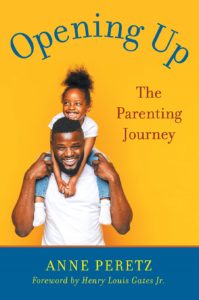“I knew I had to write this book because I’m the only one who knows the story from beginning to end,” says Anne Peretz from her Truro home.
The book is Opening Up: The Parenting Journey, published in May. It’s about Parenting Journey, originally called the Family Center, the Somerville-based organization that Peretz founded to provide therapy to low-income and disadvantaged families. The organization has expanded and now operates internationally.

Even for those without prior interest in the subject, Opening Up is a lovely book. In includes a foreword by Henry Louis Gates Jr., whom Peretz met through her ex-husband, Martin Peretz, former editor of the New Republic, who was on the faculty at Harvard. (She is now married to attorney Martin Garbus.)
Peretz founded the Family Center while working in housing projects in the mid ’80s. The book opens with a haunting vignette: Peretz is sent to the home of Colleen, who has accused her children of “parent abuse.”
“I found myself amidst a tornado of toys, papers, old food, clothes, filthy bedding, and mattresses angled off the beds,” writes Peretz. “In the middle of it all stood the perplexed mother, while her two pale children, their eyes glassy and bored, twitched as they fiddled with peanut butter sandwiches on the living room floor.”
As it turns out, Colleen is neglectful and emotionally cold. Peretz essentially tricks her into embracing her distraught son, Jimmy, by renaming the hug a “squeeze box.” It is just one of the brilliant “interventions” that Peretz describes in the book.
Peretz’s own upbringing shaped her trajectory. “I was a child of privilege and, with my mother’s death, when I was six, also a child of loss,” writes Peretz in Opening Up. Her father was Henry Richardson Labouisse Jr., an American diplomat who worked for the United Nations Relief and Rehabilitation Administration.
When Peretz was a teenager, she visited resettlement camps in Lebanon, Gaza, and Jordan. “They were just so destitute,” she says. “Everyone was in agony.” The experience profoundly affected her.

Peretz was sent to boarding school in Paris, where she consistently acted out. She even set fire to her desk so that she would be expelled. It worked. “This incident helped contribute to my later professional belief that ‘symptomatic behavior’ is not necessarily a sign of pathology,” she writes, “but rather it can be a metaphoric creation that calls attention to what needs attending.”
Peretz went to Smith College, initially studying philosophy, then government. In her third year, she married a doctor, with whom she had two children. After some delay — in which she studied at McGill University in Montreal and the New School in New York City — Peretz graduated from Smith as an art major. “As I was working on painting,” says Peretz, “I had this weird sense that I was working on something two dimensional, and the world is three dimensional. The socially conscious thing started.”
Peretz is in fact an accomplished painter. Nonetheless, she says, “When people ask, ‘Do you do art therapy?’ I say, ‘Absolutely not.’ ” Even so, many of Parenting Journey’s interventions involve drawing, dancing, or creating skits. The idea is to get families to “open up” about past traumas through diverting activities.
One intervention that Peretz describes in the book involves having participants choose from a pile of buttons with sayings like “Bad girl” or “Born to party” and then explaining their choices. Another invention, called the “mirror exercise,” involves looking in a mirror and describing what one sees.
Some interventions elicit massive realizations. Peretz describes a particularly troubling one in which a woman named Tamika described how, when she was 11 years old, her mother was stabbed to death by her then-husband. Tamika felt responsible because she refused to call her stepfather “Dad.” After recognizing her past trauma, however, Tamika was able to begin to move on.
“A big no-no for most therapists is to talk about yourself,” says Peretz. In that way, Parenting Journey’s methodology is in some sense antithetical to traditional therapy, as facilitators are encouraged to share information about themselves as a way of bonding with participants. But this is tricky, especially when they come from different cultural, racial, or socioeconomic backgrounds.
“I just get curious,” says Peretz. “Often, there’s this sense that the therapist has all the answers and is going to tell them what to do. When I was working in housing projects, I hired people who grew up in housing projects. If you don’t know something, ask them.”



